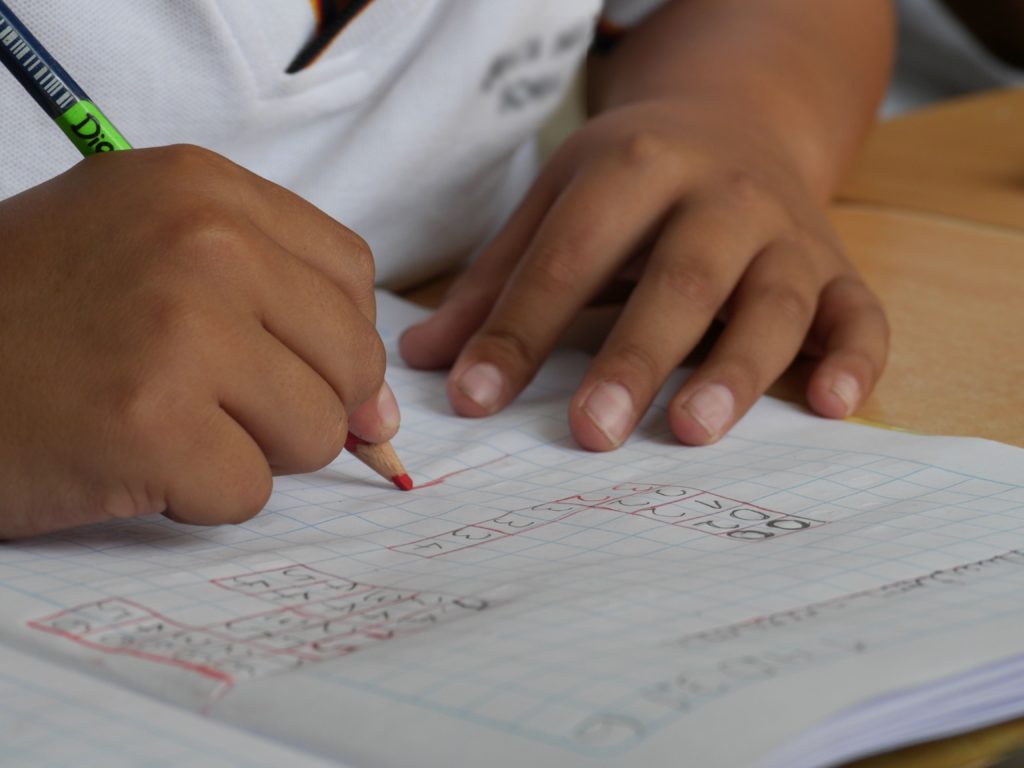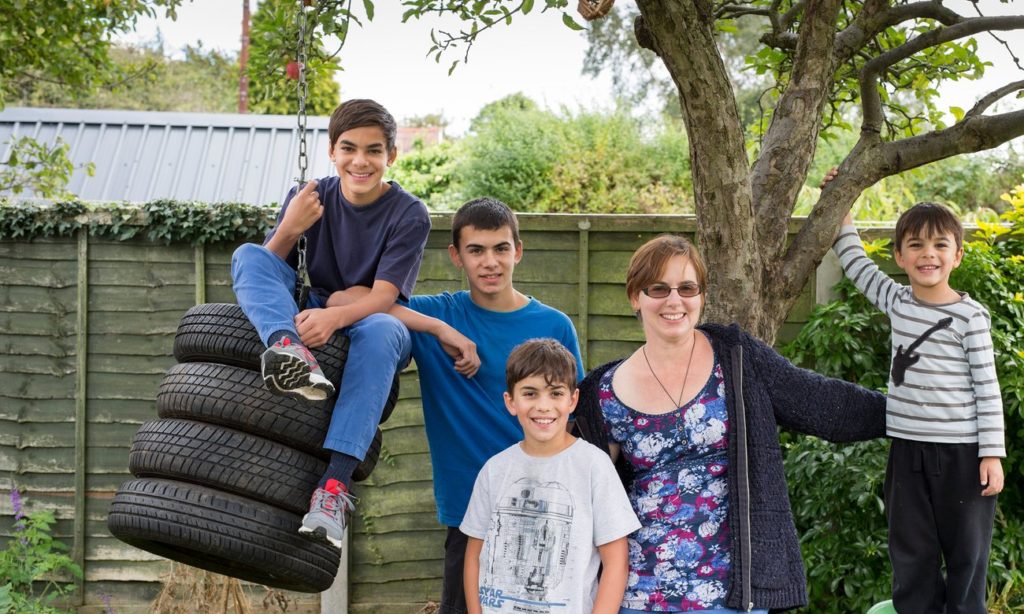Teacher/Educationalist Voice 7
Alice Khimasia – Qualified Teacher and Unschooling Parent

Alice Khimasia has been home educating for over a decade and her four sons are now aged 18, 17, 14 and 8. She always wanted to be a teacher and trained to teach RE at secondary level with English as her second subject.
However, at the end of her teacher training she was so disheartened by the reality of the school system that she left the profession altogether. She was disappointed again when her own children started school. Her older sons did four terms of primary before she decided to home educate and the younger two have never been to school at all.
Why did you decide not to become a teacher after you qualified?
At the end of my teacher training, I had to tick-off a number of objectives, one of which was to say that I had bridged the gap between the ideal my training had given me to aspire to and the reality of teaching in secondary schools. I was shocked that objective was there, and I was unable to tick the box because it seemed to me then, and still seems to me now, that we should be striving for better in our schools than the reality we are expected to accept.
Why did you decide to home educate?
When our eldest son was seven, in his fourth term at our local primary school, the light in his eyes went out. He was not thriving and became anxious. It seemed as if he was shutting down and losing his spark.
We were frustrated by the narrowness of the curriculum, with such a focus on maths and English and very little creative curriculum. Also by the pressure on schools to teach to test, even then, a decade ago, and it has only got worse since. The effect on the mental health of staff and students is detrimental to well-being.
Mostly I remember feeling deep disappointment at the boys’ educational experience and wanted it to be more enjoyable for them. Children have such an appetite for life and learning, and I wanted to harness this natural passion and enthusiasm, to fan to flame their gifts and encourage them to grow into the unique individuals they are.
You can hear more about my educational philosophy in my TED Talk:
What approach to home education do you take?
I have been unschooling myself and my sons for over a decade, and my understanding of what that means has changed and developed over time. When I started out, I understood it to mean that we were embarking upon a family adventure towards self-directed autonomous learning, that we would learn without any curriculum, without coercion, embracing the opportunities that we encountered for learning in our life together.
In more recent years, I have come to appreciate unschooling as a social justice movement. It is about consent, children’s rights, respect for land and elders, anti-racism, feminism, freedom.
What does a typical day of unschooling look like?
It is really difficult to describe a ‘typical’ day as this depends upon the child, the season and our current interests. Our weeks have a rhythm around regular commitments which over the years have included scouting, wood carving, sports groups, home ed meet-ups, time with grandparents, youth groups, nature walks with friends, time on a community allotment.
Our time at home will include sharing readalouds, baking and cooking, lots of play, project work / self directed learning.
Is it true that unschooled children can teach themselves to read, write and do maths?
My two younger sons learned to read without instruction. For both boys, their independent reading took off at age 8. It is fascinating and delightful to watch them acquire this skill for themselves in their own time. Prior to them cracking the code, we would read every day together, so books have been very much a part of our home. But it is also true that being on technology with their friends helped them learn to read and write.
My youngest son recently collaborated to write a book online with his friend and messaging friends has helped with his literacy. All four boys resisted writing when they were small, but all loved to draw which helped develop their fine motor skills. We focused on developing vocabulary with lots of oral work, opportunities for discussion and endless conversation. As they have grown, they have been willing and able to write.
Both my older boys passed GCSE English when they wanted to, with very little formal instruction prior to starting their courses. My third son actually loves to write now and has chosen to undertake a few online courses as he is interested in sports journalism.
My husband has been a secondary school maths teacher for over 20 years and believes one of the reasons children struggle with maths at secondary level is because they haven’t had enough opportunity to play with mathematical ideas and concepts in the primary years. Maths is formalised too early and many children come to believe they can’t do it.

Maths can be explored freely at home through our everyday activities, playing games, weighing and measuring, cooking and baking, money management. All our boys have had their own bank accounts from age 7 and manage their own spending. Two of them have had their own businesses through which they have learned so much. My third son learned all about percentages from watching Wimbledon!
Later, more formal maths makes more sense as it is hung on to a framework of conceptual understanding. My oldest son is gifted at maths. My second son finds it more challenging, but again, both passed GCSE maths when they wanted to with minimal formal instruction prior to starting their courses.
Are there any preconceptions about home education/unschooling that you would like to challenge?
Yes, I am particularly concerned that after this lockdown period, when so many families have been emergency schooling during the global pandemic, people will think this is what home education is like. I am worried ideas about home educated children being isolated at home will be exacerbated by this experience. The pandemic has been as disruptive to the routines of home educating families as it has to the families of schooled children. Unschoolers, too, have missed their friends, grandparents and extended families, their regular clubs and meet-ups, as well as all the usual trips and outings we would enjoy at this time of year. We have also had to adjust to parents working from home, and to potential job losses, to being at home together 24/7. I am concerned that emergency parenting during a global pandemic will be equated with home educating / unschooling. It is not the same.
People’s biggest concern about unschooling always seems to be socialisation, but there are many ways in which we are able to socialise outside of school, and with people of all different ages.

People also always ask me how my children will handle the stuff they have to get on and do if they are allowed to pursue their own passions and interests all the time. But children are very able to understand what is necessary, perfectly able to reason and to direct their own learning, to rise to challenges. We just need to trust them and give them the opportunity. Children want to be competent. They want to learn. Often I have learned the most helpful thing I can do is just to get out of their way.
Can you tell us more about your older sons’ experiences of school?
When our boys were small, we lived abroad so they missed their early years in the UK but had the experience of being in nursery overseas. In many countries, formal schooling doesn’t start until age 7 and I think a later start was beneficial.
Returning to the UK, the older two did 4 terms in our local primary school before we made the decision to home educate. We tried flexi-schooling for a while when the boys were still in primary school, but that didn’t really work for our family.
The culture of school was so different from home, they found it difficult to flex between the two. Our oldest son wanted to try secondary school, so did half a term in Year 7. He found it frustrating and boring being in the classroom as the pace was too slow and he felt a lot of time was wasted.
The older two both chose to go in to a local UTC (University Technical College) at age 14 to do GCSEs. It was an engineering college, so my oldest son got on well there, excelled, as he is a natural engineer. He found being in the classroom a challenge and flexed the system where he could, doing no homework, for example, and pushing to study in the way he wanted to. But the experience helped him to move in the direction he wanted to go.
It was a more damaging experience for our second son who found it more difficult to assert himself and needed more time to adjust. He found the long day and intensive timetable overwhelming.
Our third and fourth sons have never been to school and currently have no inclination to do so.
What do your older children plan to do next?
Our eldest son is in an engineering apprenticeship at the University of Warwick, and is studying for an HND. He intends to extend this to a degree and then a masters whilst working. He is also doing up an old Landrover on our front drive, mountain bikes in his leisure time, and buys and sells bike components.
Our second son is currently doing an online course in music production. He is technically minded and plays guitar. Music is the thing which really lights him up.
Our third son has decided to do GCSEs from home next year. He says he would like to be a tennis coach or have his own bakery. He already coaches younger children at his tennis club and has his own baking business, so he is learning as he goes.
In your opinion what are the main challenges of our current school system?
A lack of trust in the professionalism and autonomy of teachers means that we have lost so many envisioned and creative people from the profession. It is not a system which cares for people, staff or students. It is very difficult to meet the needs of individual children in such crowded classrooms. These problems are exacerbated by the constraints of the curriculum and standardised testing regime.
What are state schools doing well?
I hope that schools provide safe spaces for children who feel unsafe at home. I hope that there are still some wonderful committed teachers who genuinely care about young people and love their work. I hope that there are some children who enjoy school and whose world is made larger by the opportunities provided there. I genuinely hope so, but I struggle to see it.
I see a system which is failing too many, which doesn’t prioritise staff or student mental health and well-being, which remains steeped in colonial ideas and racism, which peddles anxiety and wields too much power over family life, which is outdated and fails to acknowledge the learning methods and demands of the 21st century.
What changes would you need to see within state education before you considered school as an option for your family?
I would need to see a very significant shift in the culture of schools towards project based learning / portfolios / 21st century skills, and a much more open door to parents / community, inviting a collaborative partnership in educating our children.
Follow Alice Khimasia
Facebook: @AliceKhimasia.OrganicEducation
Instagram: @alicekhimasia
Alice took part in a BBC documentary which was shown in October 2022 called ‘Our Big Home Education Family’. It is available to watch for a year.

